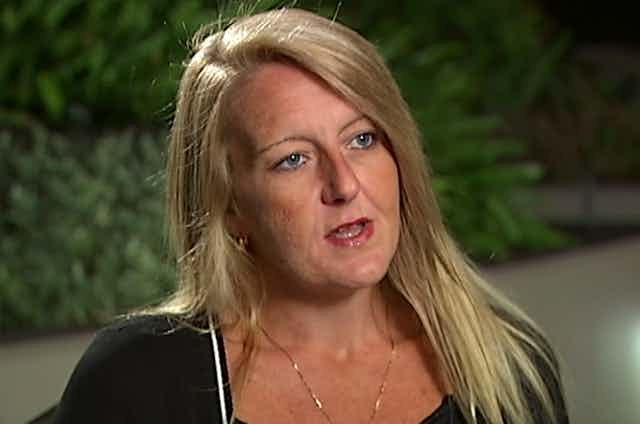For over 15 years, the Victoria police used criminal barrister Nicola Gobbo as an informant against her own clients in what has become known as the Lawyer X scandal.
The scandal has been accurately described as a massive blow to the criminal justice system.
But this week it became clear the director of public prosecutions would not bring charges against any current or former police officers in the case.
The special investigator building the cases against the officers, former High Court judge Geoffrey Nettle, said it appeared to be a “waste of time and resources” to pursue the matter any further. His office has now been disbanded, with little to show for the A$120 million that was spent on years of investigations.
While the news may have only been briefly in the headlines, this case matters greatly. The shelving of the investigation should be a concern to us all.
‘Reprehensible’ behaviour
In the early 2000s, Gobbo represented a number of notorious figures in Melbourne’s criminal underground, including Carl Williams and Tony Mokbel. At the same time, she was giving police information about her clients.
In 2018, the High Court said the use of Gobbo as a police informer “debased fundamental premises of the criminal justice system” and that police conduct in using Gobbo as an informer was “reprehensible”.
The right to a fair trial is a cornerstone of the rule of law. No trial can be fair when a person’s defence lawyer is acting as an agent of the police.
In the wake of the High Court case, a royal commission was established. It found the police use of Gobbo as an informer may have affected the convictions or findings of guilt of more than 1,000 people.
Several convictions for serious offences have since been quashed, due at least in part to the police behaviour in using Gobbo.
The royal commission found police “corrupted the criminal justice system” and “tolerated bending the rules to help solve serious crime”. Senior police were implicated.
Why bringing charges against police is difficult
The scandal and its aftermath point to a systemic failure of police accountability. Such failure is fertile soil for police corruption and makes a repeat of the Lawyer X scandal entirely possible.
The scandal was kept under wraps for nearly a decade as police fought through the courts to suppress information about their use of Gobbo.
According to the royal commission, hundreds of people within Victoria Police knew about Gobbo. The Independent Broad-based Anti-corruption Commission (IBAC) also knew about Gobbo, but decided in 2015 it did not have the jurisdiction to deal with it.
IBAC sent the matter back to police to investigate. The police showed little inclination to investigate.
In short, there was no investigative body capable or willing to investigate the police tactic of using a criminal lawyer as a source against her own clients.
Read more: Expanding Victoria's police powers without robust, independent oversight is a dangerous idea
The key recommendation of the royal commission was the appointment of a special investigator, Geoffrey Nettle, to do the job. However, the director of public prosecutions maintained final say over whether any charges would be pursued.
While the director of public prosecutions is formally an independent body, bringing charges against police can still be professionally challenging, particularly when senior police may be involved. The director of public prosecutions relies on close police cooperation for its everyday operations.
The police are also politically powerful. In 1993, after a former Victorian director of public prosecutions charged police officers over fatal shootings, the government sought to undermine his independence, prompting his resignation.
Nettle believed his office had “established a powerful case of offending” in the Lawyer X scandal.
The director of public prosecutions, Kerri Judd, declined to pursue charges, however, because of the time that had elapsed since the alleged offences and because the police involved would be able to run a defence “that any wrong or improper decisions […] were made in good faith in an effort to solve and prevent serious criminality”.
In addition, she said she had no confidence in Gobbo as a witness.
Calls for reform
The Lawyer X case provides a stark demonstration of why we need to address systemic failures in investigating police misconduct.
While the IBAC provides the promise of independent oversight, it is limited by a lack of resources, jurisdiction and investigative powers. In Victoria, police investigate at least 98% of complaints against police, and very few complaints are substantiated.
A parliamentary inquiry into IBAC made a raft of recommendations for change in the system of police oversight in 2018, but these have not been implemented.
In a positive sign, key recommendations of the royal commission into the Lawyer X scandal have been implemented. Legislation covering 25 of the recommendations related to the management of police informers has been passed.
However, these recent changes to the law also allow police to register lawyers as informants in some circumstances. This has the danger of institutionalising what could be a corrupt practice.
In addition, the external oversight of this informant registration scheme is in many respects similar to the flawed police oversight that contributed to the Lawyer X scandal in the first place.
The High Court said in relation to the scandal, “it is greatly to be hoped that it will never be repeated”. Without real reform to the way the police are policed and held to account, there is a very real possibility that it will be.

